Today marks what would have been Coretta Scott King’s 95th birthday. Although she passed in 2006 at the tender age of 78, her impact will last a lifetime.
Throughout the years, this amazing woman has come to be known as the wife of Dr. Martin Luther King Jr., but it was her dedication to women’s rights, advocacy for the LGBTQ+ community, and her contributions to advancing the quality of life for all human beings is what made her truly special.
“Sometimes, I am also identified as a civil rights leader or a human rights activist,” Coretta once said. “I would also like to be thought of as a complex, three-dimensional, flesh-and-blood human being with a rich storehouse of experiences, much like everyone else, yet unique in my own way, much like everyone else.”
(Original Caption) Mrs. Coretta King, widow of Dr. Martin Luther King, Jr., acknowledges applause, as she prepares antiwar rally on the Ellipse across from the White House.Born in Heiberger, Alabama, Coretta was born into a working-class family and her parents made it a priority to instill pride in their children, as well as stressing to them the importance of education. Upon graduating from Lincoln Norman High School as its valedictorian, she received a B.A. in Music and Education from Antioch College, as well as earning a Bachelors of Music at the New England Conservatory in Boston. It was her upbringing and her background as a musician that molded her as a woman and allowed her to become so pivotal in the Civil Rights Movement of the 1950s and beyond.
After meeting a young Dr. King in 1952, Coretta would embark on a journey that would ultimately make her influential within the realm of politics, human rights, racial justice, and so much more. Upon her passing in 2006, the author and activist had become revered in the African American community, and stood as an icon for everyone, regardless of race, age, or gender.
“Freedom and justice cannot be parceled out in pieces to suit political convenience. I don’t believe you can stand for freedom for one group of people and deny it to others.”
In celebration of Coretta Scott King’s birthday, here are some of the worldly contributions she made towards seeking equality for all.
01She served as a symbol for the dedication of African American women during the movement.When Dr. Martin Luther King Jr. became the full-time pastor of Dexter Avenue Baptist Church in Montgomery, Alabama in 1954, Coretta let go of her musical career ambitions and devoted her life to her husband, her family, and the Civil Rights Movement. Along with being leaders, demonstrators and organizers for this amazing cause, Black women across America also remained strong enough to hold together the household. Coretta was the perfect symbol for all women, mothers, and wives in the struggle.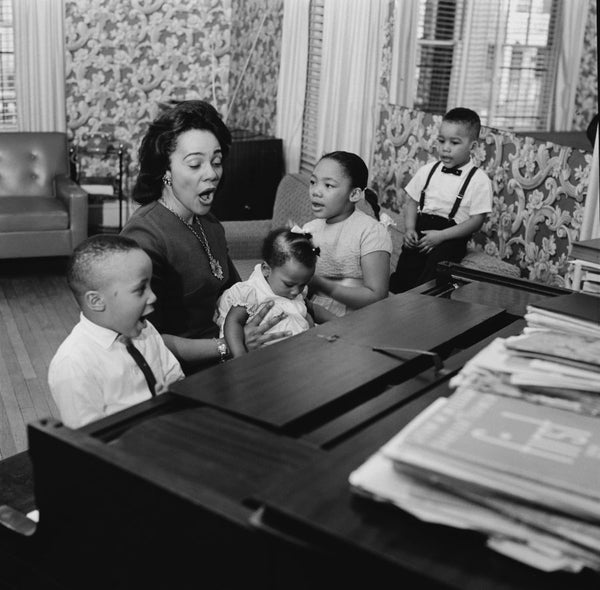 Photo by Michael Ochs Archives 02The phone conservation with JFK.After her husband was sent to jail in October of 1960, presidential candidate John F. Kennedy called Coretta in order to express sympathy, and MLK was released a day later. Historians say that his conversation between Coretta and JFK earned Kennedy a large number of Black votes, which swayed the election in his favor – thus changing the course of history.
Photo by Michael Ochs Archives 02The phone conservation with JFK.After her husband was sent to jail in October of 1960, presidential candidate John F. Kennedy called Coretta in order to express sympathy, and MLK was released a day later. Historians say that his conversation between Coretta and JFK earned Kennedy a large number of Black votes, which swayed the election in his favor – thus changing the course of history. 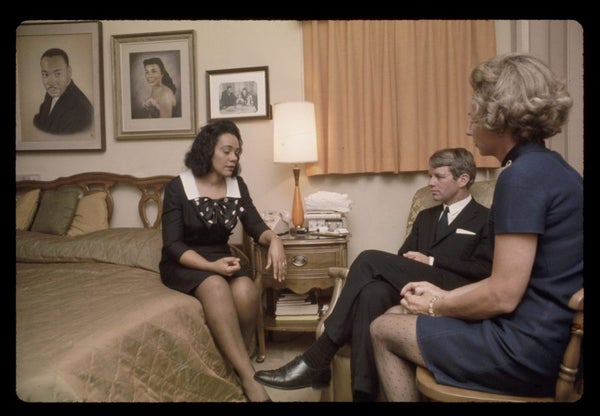 03The Women Strike for Peace.Coretta served as a delegate for the Women Strike for Peace Conference in Geneva, Switzerland in April of 1962. In her travels around the world, she witnessed the unfair treatment of women in the U.S. and abroad, as well as the violence in third world countries. Coretta’s heightened concern for this led her to the conference to delegate the 17-nation Disarmament Conference.
03The Women Strike for Peace.Coretta served as a delegate for the Women Strike for Peace Conference in Geneva, Switzerland in April of 1962. In her travels around the world, she witnessed the unfair treatment of women in the U.S. and abroad, as well as the violence in third world countries. Coretta’s heightened concern for this led her to the conference to delegate the 17-nation Disarmament Conference. 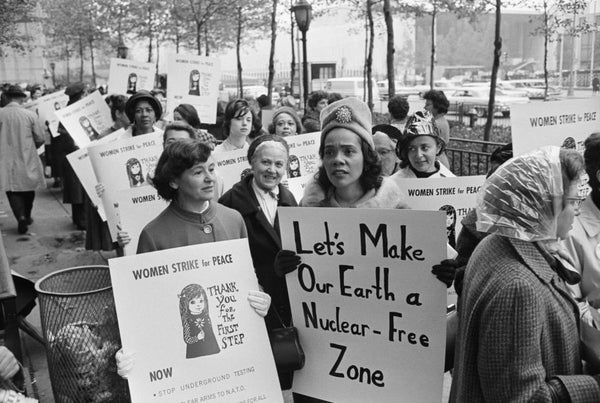 04Sexism in the Civil Rights Movement.Although she never wavered in support of her husband, Coretta still emphasized some of the flaws in the movement. In 1966 in an issue of New Lady magazine, she said that “Not enough attention has been focused on the roles played by women in the struggle. By and large, men have formed the leadership in the civil rights struggle but … women have been the backbone of the whole civil rights movement.” This spoke to her loyalty to her gender along with her race.
04Sexism in the Civil Rights Movement.Although she never wavered in support of her husband, Coretta still emphasized some of the flaws in the movement. In 1966 in an issue of New Lady magazine, she said that “Not enough attention has been focused on the roles played by women in the struggle. By and large, men have formed the leadership in the civil rights struggle but … women have been the backbone of the whole civil rights movement.” This spoke to her loyalty to her gender along with her race. 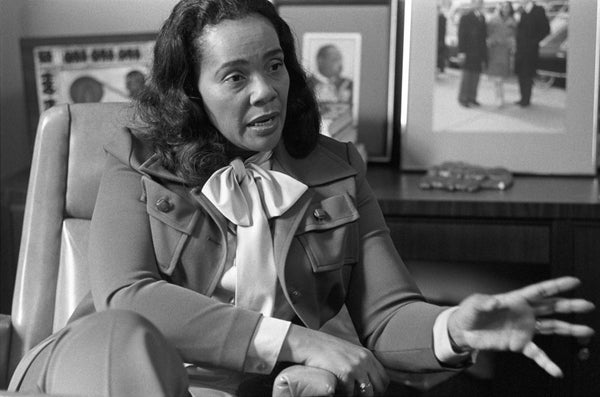 Photo by Tom Hill 05Taking on the biggest responsibility.After the assassination of her husband in April of 1968, Mrs. King took it upon herself to become a leader in the Civil Rights Movement. She also widened her priorities to not just the Black struggle, but issues surrounding the rights of women and the LGBTQ+ community, the economy, and the like. In subsequent years she founded the King Center for Nonviolent Social Change in Atlanta, published a memoir, and spoke at several rallies, including the Moratorium to End the War in Vietnam in 1969.
Photo by Tom Hill 05Taking on the biggest responsibility.After the assassination of her husband in April of 1968, Mrs. King took it upon herself to become a leader in the Civil Rights Movement. She also widened her priorities to not just the Black struggle, but issues surrounding the rights of women and the LGBTQ+ community, the economy, and the like. In subsequent years she founded the King Center for Nonviolent Social Change in Atlanta, published a memoir, and spoke at several rallies, including the Moratorium to End the War in Vietnam in 1969. 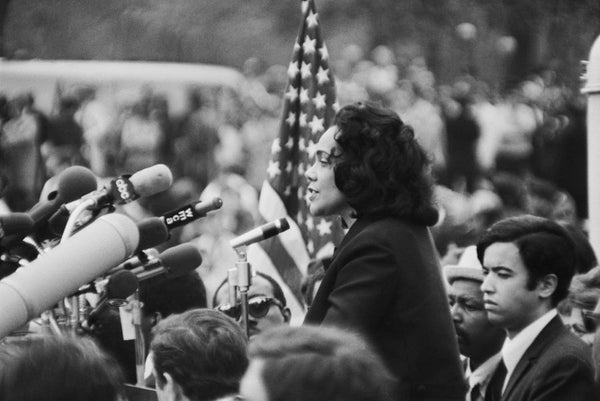 06Forming the Coalition of Conscience.Mrs. King brought together upwards of 100 human rights organizations who advocated for equal economic opportunities for all. Almost ten years later, she got over 800 human rights organizations together to form the Coalition of Conscience, sponsors of the 20th Anniversary March on Washington. During this march, the primary focus was getting the government to pass Dr. King’s birthday as a national holiday. It was signed into law as a holiday in 1983 and “Dr. Martin Luther King Day” was observed for the first time in January of 1986.
06Forming the Coalition of Conscience.Mrs. King brought together upwards of 100 human rights organizations who advocated for equal economic opportunities for all. Almost ten years later, she got over 800 human rights organizations together to form the Coalition of Conscience, sponsors of the 20th Anniversary March on Washington. During this march, the primary focus was getting the government to pass Dr. King’s birthday as a national holiday. It was signed into law as a holiday in 1983 and “Dr. Martin Luther King Day” was observed for the first time in January of 1986. 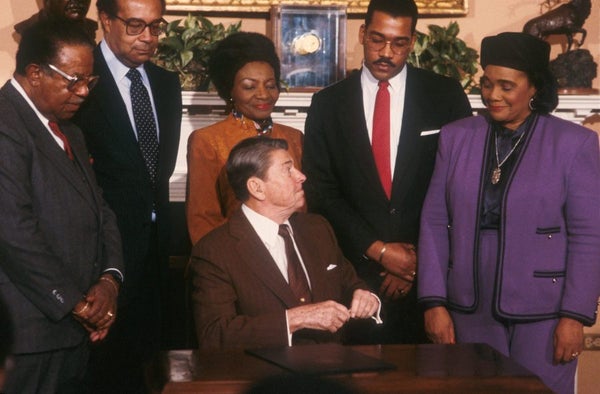 Photo by Diana Walker 07Mrs. King was a longtime supporter of the LGBTQ+ community.In 1983, King wanted the Civil Rights Act to include gays and lesbians as a protected class. Three years later as the featured speaker at the New York Gala of the Human Rights Campaign Fund, she talked about her supported for gays and lesbians, and how important they had been in the struggle. In the years that followed, Mrs. King spoke out against homophobia on several occasions, and wanted America to prioritize equality of all people, regardless of sexual preference.
Photo by Diana Walker 07Mrs. King was a longtime supporter of the LGBTQ+ community.In 1983, King wanted the Civil Rights Act to include gays and lesbians as a protected class. Three years later as the featured speaker at the New York Gala of the Human Rights Campaign Fund, she talked about her supported for gays and lesbians, and how important they had been in the struggle. In the years that followed, Mrs. King spoke out against homophobia on several occasions, and wanted America to prioritize equality of all people, regardless of sexual preference. 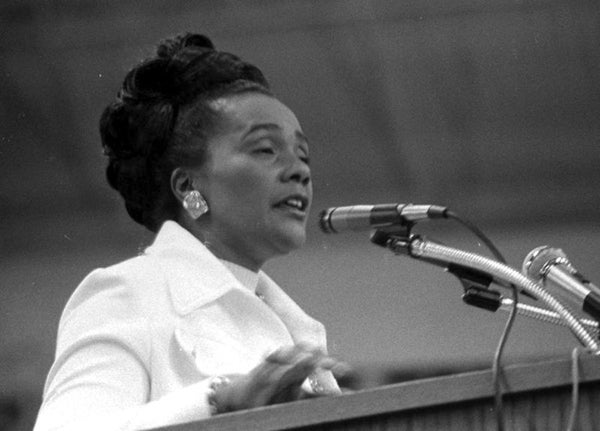 Photo by Robert Abbott Sengstacke 08The swan song to a beautiful life.In the year before her death, King let her alma mater Antioch College use her name and likeness in the founding of the Coretta Scott King Center. The center opened in 2007, and focused on issues of human rights for the campus of Antioch, along with the area surrounding it.
Photo by Robert Abbott Sengstacke 08The swan song to a beautiful life.In the year before her death, King let her alma mater Antioch College use her name and likeness in the founding of the Coretta Scott King Center. The center opened in 2007, and focused on issues of human rights for the campus of Antioch, along with the area surrounding it. 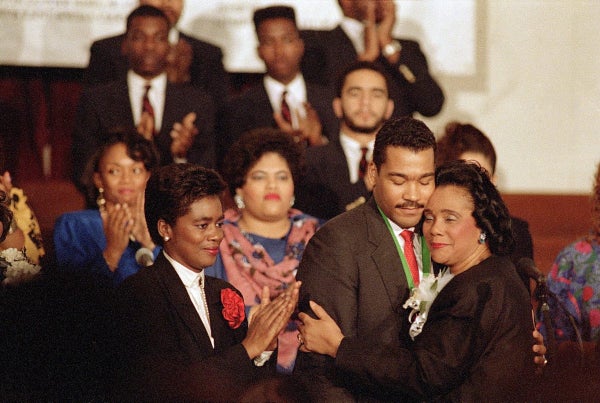
TOPICS: birthday Coretta Scott-King dr. martin luther king jr
The post Remembering Coretta Scott King: The Impact Of The Author, Activist And Civil Rights Leader appeared first on Essence.


0 Commentaires